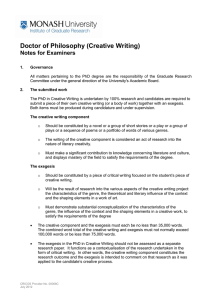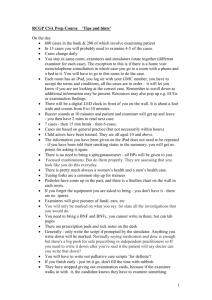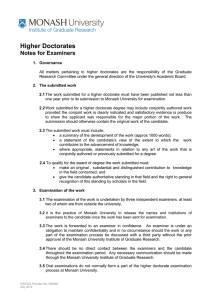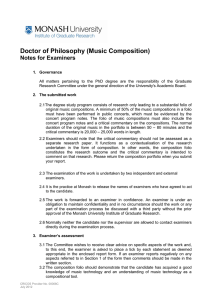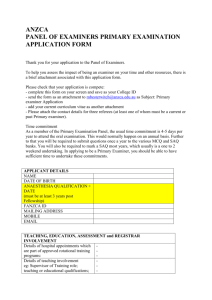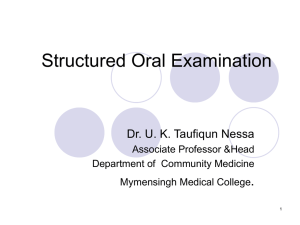Doctor of Philosophy (Music Performance) Notes for Examiners
advertisement
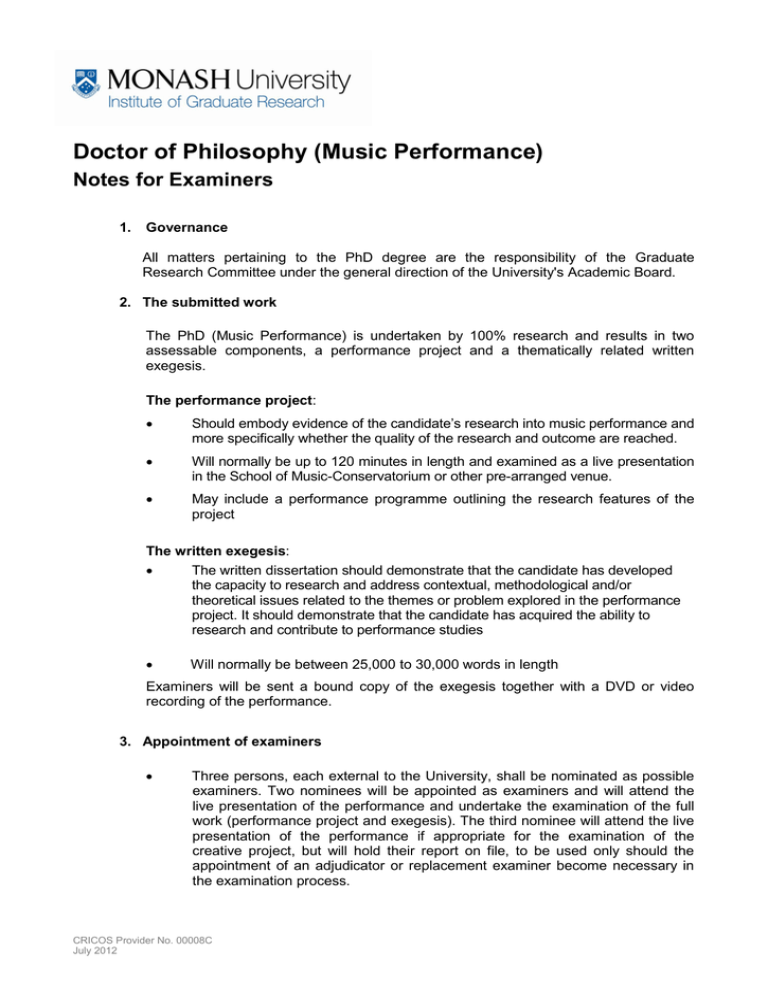
Doctor of Philosophy (Music Performance) Notes for Examiners 1. Governance All matters pertaining to the PhD degree are the responsibility of the Graduate Research Committee under the general direction of the University's Academic Board. 2. The submitted work The PhD (Music Performance) is undertaken by 100% research and results in two assessable components, a performance project and a thematically related written exegesis. The performance project: • Should embody evidence of the candidate’s research into music performance and more specifically whether the quality of the research and outcome are reached. • Will normally be up to 120 minutes in length and examined as a live presentation in the School of Music-Conservatorium or other pre-arranged venue. • May include a performance programme outlining the research features of the project The written exegesis: • The written dissertation should demonstrate that the candidate has developed the capacity to research and address contextual, methodological and/or theoretical issues related to the themes or problem explored in the performance project. It should demonstrate that the candidate has acquired the ability to research and contribute to performance studies • Will normally be between 25,000 to 30,000 words in length Examiners will be sent a bound copy of the exegesis together with a DVD or video recording of the performance. 3. Appointment of examiners • Three persons, each external to the University, shall be nominated as possible examiners. Two nominees will be appointed as examiners and will attend the live presentation of the performance and undertake the examination of the full work (performance project and exegesis). The third nominee will attend the live presentation of the performance if appropriate for the examination of the creative project, but will hold their report on file, to be used only should the appointment of an adjudicator or replacement examiner become necessary in the examination process. CRICOS Provider No. 00008C July 2012 • It is the practice at Monash University to release the names of examiners who have agreed to act to the candidate when the work is dispatched for examination. • The work is forwarded to an examiner in confidence. An examiner is under an obligation to maintain confidentiality and in no circumstance should the work or any part of the examination process be discussed with a third party without the prior approval of the Monash University Institute of Graduate Research. • There should not normally be any direct contact between the examiner and candidate and/or supervisor during the examination process. Any communication should be via the Monash University Institute of Graduate Research. 4. The examination process • Examiners attend the live presentation of the performance project, if relevant, but must not consult with each other before, during or after the performance. Examiners are asked to write a report on the performance immediately after the presentation and hold this report on file until the accompanying written exegesis is received by post. • The exegesis will be submitted to the Monash University Institute of Graduate Research within two months of the performance presentation. The bound exegesis will be sent to the examiners together with a DVD or video recording of the performance project. The examiners then complete the pro forma report form and write a detailed report on the exegesis and the performance project. • Once the examination is complete, the examiner should return the DVD/video, written exegesis to the Monash University Institute of Graduate Research together with their report. 5. Examiner’s assessment • The Graduate Research Committee wishes to receive clear advice on specific aspects of the work and, to this end, the examiner is asked to respond to each statement in Section 1 of the enclosed examiner’s report form. If an examiner reports negatively on any aspects referred to in Section 1 then comments should be made in the examiner’s detailed report. A positive response must be received to statements (iv) and (v) in Section 1 of the report form for the work to pass. • Recommendation 2(ii) Pass – amendments to Head of Department and 2(iii) Pass – amendments to examiner should be made only when the examiner can specify amendments with reasonable precision. • An examiner may request that the University obtains clarification from the candidate on specific points in the work. Such requests should be made only through the Monash University Institute of Graduate Research. • Oral examinations are not normally a part of the examination process. If the examiner has generated a list of questions from the examination, these can be put to the candidate via recommendation 2(iv) Pass-questions. Under this recommendation, a candidate would normally respond to these questions in writing and may amend the dissertation as result of this process. • In the case of recommendation 2(v) Revision and Resubmission, if a revised performance project is required and the original examiner is prepared to act as examiner for the revised work, they will be initially notified of the re-performance dates by the supervisor. CRICOS Provider No. 00008C July 2012 • Where examiners deem it necessary to annotate the work, it should be done lightly in pencil or by the use of temporary adhesive labels. 6. Following receipt of both examiners’ reports • Unedited copies of the examiners’ reports are forwarded to the candidate in due course. • In the event that the two examiners disagree substantially in their assessment of the work, the relevant faculty is required to convene an advisory panel to determine a course of action. Most commonly an advisory panel will recommend either that: • the work be revised and resubmitted to the original dissenting examiner(s); or • an adjudicator be appointed to review the two examiners’ reports, the candidate’s response to the reports and the work itself. The third nominee would normally be appointed to adjudicate in this instance. The names of the examiners are not revealed to the adjudicator. • Examiners will be advised when a candidate is asked to revise and resubmit his/her work. • All examiners will be notified of the outcome of the examination. For a detailed explanation of thesis and examination matters at Monash University please visit: http://www.mrgs.monash.edu.au/research/examination/index.html or contact the Research Degrees Examinations Unit. Research Degrees Examinations Unit Monash University Institute of Graduate Research Building 3D, Clayton Campus, Wellington Rd, VIC 3800, Australia Telephone + 61 3 9905 3047 Facsimile + 61 3 9905 5042 Email migrexams@monash.edu CRICOS Provider No. 00008C July 2012
